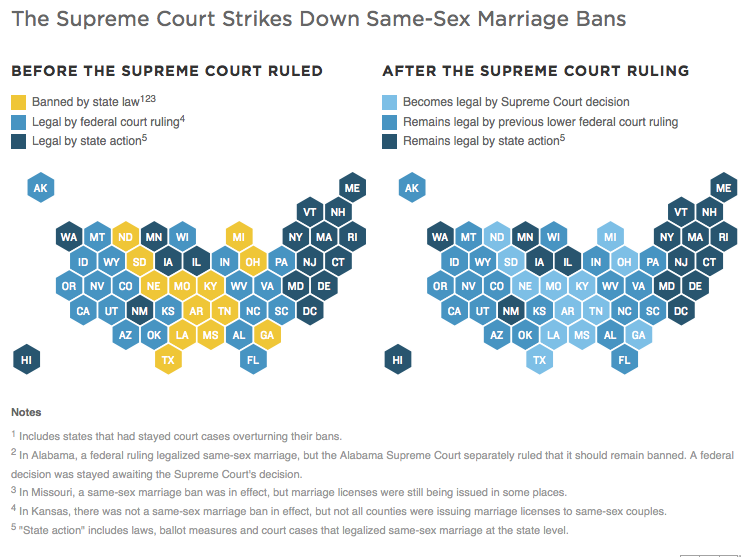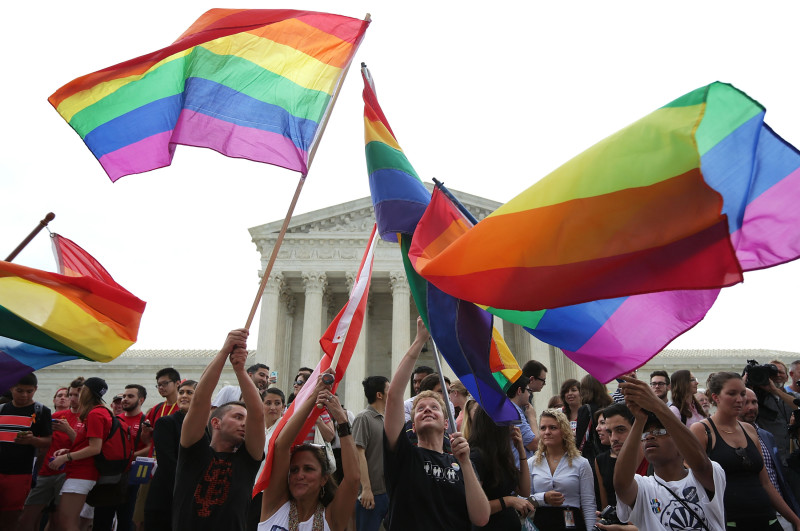
The court faced two main questions in Obergefell v. Hodges:
- Do same-sex couples have a constitutional right to marry?
- If states can ban same-sex marriages, can states not recognize same-sex marriages performed in other states where it is legal?
The decision is the culmination of a decades-long struggle in the courts, statehouses and at the ballot box.
Just two years ago, the Supreme Court struck down part of the federal law that denied a range of government benefits to legally married same-sex couples.
The decision in United States v. Windsor did not address the validity of state marriage bans, but courts across the country, with few exceptions, said its logic compelled them to invalidate state laws that prohibited gay and lesbian couples from marrying.
The court's ruling on Proposition 8 was much more narrow, applying only to California.
UCLA's Williams Institute estimates that there are 390,000 married same-sex couples. The Supreme Court's landmark decision today could mean that another 70,000 couples living in the 13 states that do not currently permit them to wed would get married in the next three years, the Williams Institute estimates. There are roughly 1 million same-sex couples, married and unmarried, who live together in the United States, the institute says.
Stories of Love, Life Before the High Court
Many of the 19 men and women involved in Obergefell v. Hodges call themselves "accidental activists" because they filed lawsuits not to legalize same-sex marriage nationally, but because of how the bans impacted their lives.
Two of the plaintiffs in Friday's case married in California.
Matthew Mansell married his husband, John, in San Francisco in 2008, before voters passed Prop. 8. In 2012, they moved to Tennessee with their two children for work. Mansell says they quickly found that their marriage wasn't recognized.
"We were always concerned about whether we would have issues with doctors or with any government agencies with regard to our children or even with regard to services for my husband or for myself," Mansell said.
They joined a lawsuit against Tennessee, arguing the state should recognize their marriage. They initially won, but a federal appeals court ruled against them.
Mansell and his family now live in Orange County. He says a victory at the highest court in the nation would teach their kids to stand up for what you believe in.
April DeBoer and Jayne Rowse were not planning to challenge Michigan's ban on same-sex marriage when they went to court to win the right to jointly adopt each other's children. A federal judge transformed their case into one about the right to marry, and the nurses have become celebrities in their Detroit suburb of Hazel Park.
"We've been stopped multiple times at our local shopping center with people just telling their story. These are people's lives that we've changed," DeBoer said.
They live with their four adopted children, ages 2 to 6, and a foster child. Each woman has adopted two kids, but Michigan ties joint adoption to marriage.
"We decided that not doing anything would do more harm to our children than standing up and saying we're going to fight," DeBoer said.
A middle-of-the night trip to the emergency room, with her 9-month-old son coughing and laboring to breathe, gave Pam Yorksmith her latest reminder of why she took up the fight for same-sex marriage.
Before baby Orion could be treated for croup, the hospital had to call his birth mother — Yorksmith's wife, Nicole — "to get permission to treat my child," Yorksmith said.
Although the Yorksmiths started their family together through artificial insemination, hospital records and Orion's birth certificate don't list Pam Yorksmith as a parent.
The Next Battles
Efforts to carve out religious exemptions for people and institutions that object to same-sex marriage are also under attack. It is clear that churches do not have to marry same-sex couples if doing so violates their religious tenets, but what about county clerks? Can photographers
refuse to shoot same-sex weddings? Can bakers decline to bake a cake for two men?
Civil rights groups say they will continue pressing for other protections from discrimination against LGBT people in employment and housing, among other areas. Even if same-sex couples win the right to marry everywhere, people still can be fired because of their sexual orientation in more than half the states.
This post includes reporting by Scott Shafer of KQED News and Mark Sherman of the Associated Press.

